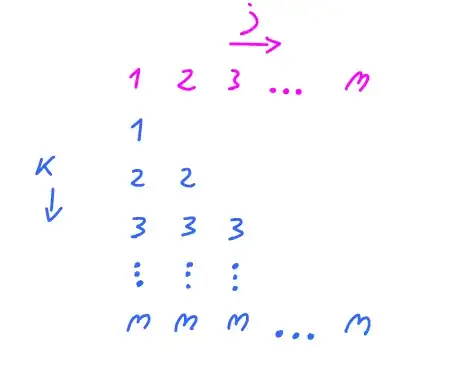I came across the following identity: $$ \frac{1}{n}\sum_{j=1}^{n}\sum_{k=j}^{n}\frac{1}{k}=1. $$ However, I do not know how to prove it except verify it by numerical calculations. Does any one know how to prove it or give me some hints? Thanks very much.
5 Answers
Using Iverson Brackets can simplify the changing of the order of summation: $$ \begin{align} \frac1n\sum_{j=1}^n\sum_{k=j}^n\frac1k &=\frac1n\sum_{j=1}^n\sum_{k=1}^n[k\ge j]\frac1k\\ &=\frac1n\sum_{k=1}^n\sum_{j=1}^n[k\ge j]\frac1k\\ &=\frac1n\sum_{k=1}^n\sum_{j=1}^k\frac1k\\ &=\frac1n\sum_{k=1}^n1\\[9pt] &=1 \end{align} $$
- 345,667
-
Thank you so much – user377704 Nov 20 '19 at 12:07
-
@robjohn Thanks for mentioning Iverson Brackets of which I was not aware. For some time I was looking for a mathematics symbol for the Mathematica command Boole[]. – Dr. Wolfgang Hintze Nov 21 '19 at 08:12
In the double sum $$\sum_{j=1}^{n}\sum_{k=j}^{n}\frac{1}{k}$$ each fraction $1/k$ occurs $k$ times, so overall these contribute $1$ to the sum. As $k$ ranges from $1$ to $n$, the total sum is $n$.
- 158,341
We can also write the index region conveniently to better see what's going on.
We obtain \begin{align*} \frac{1}{n}\sum_{j=1}^n\sum_{k=j}^n\frac{1}{k}&=\frac{1}{n}\sum_{\color{blue}{1\leq j\leq k\leq n}}\frac{1}{k}\\ &=\frac{1}{n}\sum_{k=1}^n\sum_{j=1}^k\frac{1}{k}\\ &=\frac{1}{n}\sum_{k=1}^n1\\ &=1 \end{align*}
- 108,315
-
-
-
(+1) That is pretty much what I was trying to do with the Iverson Brackets. – robjohn Nov 20 '19 at 13:44
-
-
1Your way of viewing this might be clearer to some. That makes it useful. – robjohn Nov 20 '19 at 14:22
Another proof uses the well-known formula for the sum of harmonic numbers
$$\sum_{k=1}^{n} H_k = (n+1)H_n -n$$
The double sum of the OP can be written as
$$\frac{1}{n} \sum_{j=1}^{n}\left (H_n - H_{j-1}\right)\\ =H_n - \frac{1}{n} \sum_{m=1}^{n-1} H_m\\ = H_n - \frac{1}{n} \left (n H_{n-1} -n +1\right)\\ = H_n - H_{n-1} + 1 -\frac{1}{n} = 1$$
In the second line we have used that $H_0=0$, and in last line we have employed the defining recursion relation of the harmonic numbers.
- 12,465
By double counting we have
$$\frac{1}{n}\sum_{j=1}^{n}\sum_{k=j}^{n}\frac{1}{k}=\frac1n \sum_{k=1}^{n}\sum_{j=1}^{k}\frac{1}{k}=\frac1n \sum_{k=1}^{n}1=\frac1n \cdot n=1$$
- 154,566
-
-
@Tony You are welcome. As you can see, reversing the counting method, it becomes trivial. – user Nov 20 '19 at 12:23
-
2IMHO this is the most enlighting method to show what is going on in double sums. – Dr. Wolfgang Hintze Nov 21 '19 at 08:16
-
